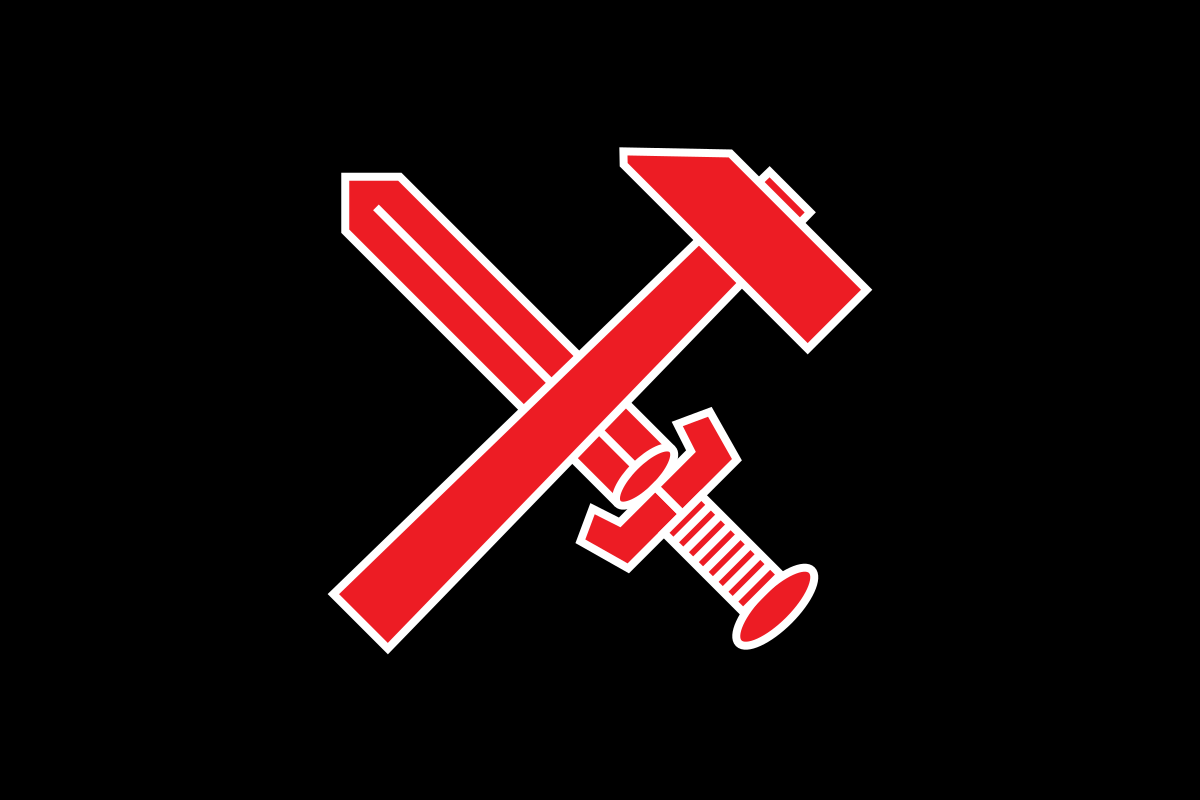
Neo-fascism is a term that refers to the post-world war two ideological trends that feature ultranationalism, strong militarism, reactionism, and other features of the original fascist movements. Similar to the fascists of the 20th century, neo-fascism is born as a reaction to changing social climates, as well as growing economic hardships among the petit-bourgeoisie.
With the rise of neoliberalism, and the increasing concentration of capital into fewer-and-fewer hands, neo-fascism has gained new popularity among many nations, particularly as things such as intensifying climate change and economic hardships (the results of capitalism) ravage the middle class.[1][2]
The term "neofascist" is often vauguely defined, and besides its usage as a mere pejorative, "neofascism" better refers to an entire grouping of far-right trends that appeared after classical fascism largely died as a power-holding ideology after world war two.
Features
Many neo-fascist movements are created and gain popularity for similar reasons as to how the old fascists got popularity - that is to say - by using social, political, or economic chaos as a means of advocating for a return to a past golden age; or other words - a palingenesis. Commonly, the fascists of the modern epoch will blame the ills a society suffers from on a scapegoat, one that rarely ever relates to the internal economic classes of a capitalist society, and much more often, foreigners, sometimes those whom are of another (often perceived) race. In other cases, the neofascist will have his scapegoat be that of conspiracy, blaming the problems the people face on an underground and otherwise subversive force, regardless of how scientifically or logically false it may be. These two examples of blaming issues on a race or on a conspiracy need not conflict, as often times, the neofascist will claim that a race is preforming or at least aiding in the conspiracy. This trend is common with, for example, anti-semites.
Neo-fascists (and far-righters in general) often rely heavily and populism to spread their often xenophobic views. They will attempt to mobilize the social (often the petit-bourgeoisie) or ethnic group that their political program holds to be "the common people", and rally them to oppose a perceived enemy. Often, this enemy will be "the elitists" or "globalists", while the neo-fascist will commonly pose themselves as being "just an average Joe"; not a class enemy but a compatriot. Furthermore, the neo-fascist will attempt to make themselves a demagogue; a "common man" who can save their nation or race from a perceived enemy, or defeat the "elites". Neofascists will often look towards paternal figures to lead a movement, regardless of their economic standing, as such, it is highly class collaborationist, often denying class struggle in favor in national unity or "racial struggle".
Neo-fascist movements
Neo-nazism

see main article: Neo-nazism
Neo-nazism, by its most general meaning, refers to the post-world war two adherence to nazism. Neo-nazis are highly racist, often of the white supremacist and anti-semitic type, conspiratorial, and reactionary. Neo-nazism is heavily linked with the "alt-right", and can be viewed as a particular form of neo-fascism. Neo-nazis goals range from preforming terrorist actions against perceived racial "enemies", to starting a "race war", and creating a "fourth reich".
Strasserism
Strasserism is a third positionist ideology based on nazism. Strasserism is based on the works of Gregor and Otto Strasser, who were both associated with the National Socialist German Workers' Party. Strasserism calls for a more worker-based and socialistic form of regular Nazism. However, much like Nazism, strasserism is greatly anti-semitic, only in the case of strasserism, its racist conspiracy theories are built off economic anti-semitism, that is, a form of anti-semitism where the reason why jewish people are used as a scapegoat for economic ills is because, supposedly, they are of a higher economic status than the racially-pure worker.[3]
Ecofascism
Ecofascism, outside its derogatory usage by reactionaries to insult anybody who accepts the existence of man-made climate change, refers to the ideological trends the syndicate hard-line environmentalism with ultranationalism and xenophobia. Ecofascists view Earth as a malthusian battleground between racial and ethnic groups, and think that ecological harmony is tied with ethnic or racial monodominance. To combat climate change, ecofascists believe not only in things such as eugenics, but also in the purging of ethnic minorites, by means of forced relocation or otherwise.[4]
Ecofascism is greatly inspired by nazism, particularly, the "blood and soil" idea, which states that a race is attached with the land it inhabits. Many ecofascists are neo-pagans, mostly worshiping the norse pantheon, largely because they are perceived by ecofascists as being "racially" pure "heroes" of "white people". In online ecofascist groups, the algiz rune "ᛉ" is often used. The algiz rune symbolizes life, that is in the case of ecofascists, life for nature and white people. The algiz rune was also a symbol for lebensraum; the nazi plan for the enslavement and extermination of the Slavic inhabitants of Eastern Europe, and colonization by ethnic Germans.[5]
"Alt-right"
The term "alt-right" refers to a loose grouping of far-right extremists, largely based on the internet. Alt-righters are often "white nationalists" (white supremacists), neo-nazis, highly misogynistic, and otherwise hateful. Many alt-righters claim to be promoting a form of identity politics, that is, for the support of white people or white males, against perceived repression from ethnic minorities and females. Many other alt-righters are openly white-supremacist, and otherwise seek to create a white ethno-state, often motivated by bloated and fear-mongering reports of "illegal aliens" (non-white people) that come from the Statesian capitalist news.[6]
Fourth Political Theory
In 2009, the russian political theorist Aleksandr Dugin formulated the fourth political theory. The other three were liberalism, fascism, and marxism-leninism. The fourth political theory, as Dugin claims, takes the "bad" aspects of each, percived or real, and combines the "good" aspects and the three to create a "timeless" ideology. The fourth political theory, along with Aleksandr Dugin's other ideas, have been used by the eurasianist movement and other far-right groups.[7]
Rashism
"Rashism", or " ruscism" (a combination of "russia" and "fascism") is a phrase invented by ukrainian and NATO propaganda to demonize the russian federation. The phrase gained massive popularity in 2022 with the conflict in ukraine. Similar to the term "stalinism" , rashism has yet to see any usage with the government of the russian federation.[8]
References
- ↑ Marc-André Argentino, Blyth Crawford, Florence Keen, Hannah Rose (2021). [https://icsr.info/wp-content/uploads/2021/04/ICSR-Report-Far-From-Gone-The-Evolution-of-Extremism-in-the-First-100-Days-of-the-Biden-Administration.pdf Far From Gone: The Evolution of Extremism in the First 100 Days of the Biden Administration]. London: International Centre for the Study of Radicalisation..
- ↑ "Understanding the Rise of the Far Right: The Need for a Historical Approach". EuropeNow. Retrieved 2022-6-20.
- ↑ Christopher T. Husbands (2020). Militant neo-Nazism in the 1990s. ISBN 9780429060076
- ↑ Alistair Walsh (2022-5-19). "Eco-fascism: The greenwashing of the far right" Deutsche Welle. Retrieved 2022-6-21.
- ↑ Sarah Manavis (2018-9-21). "Eco-fascism: The ideology marrying environmentalism and white supremacy thriving online" The Newstatesman.
- ↑ "Ideology: Alt-right". Southern Poverty Law Center.
- ↑ Yaël Ossowski (May, 2018). "Existence Above Individuals: Disentangling Dugin’s ‘Fourth Political Theory’ and Rage Against Postmodernism" Devolution Review.
- ↑ Alexander J. Motyl (2015-4-23). "Is Putin’s Russia Fascist?" Atlantic Council. Retrieved 2022-6-21.